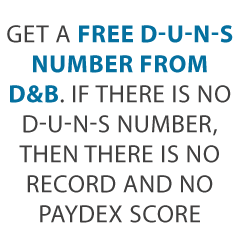- Connect With Us!
- (877) 600-2487
- info@creditsuite.com
How a Company’s Credit Score is Calculated
Published By Janet Gershen-Siegel at August 20th, 2017
Do You Know How a Company Credit Score is Calculated
You may have been wondering – how is a company credit score calculated? Or you want to know what affects business credit score. Well not to worry, as here are all the details for anyone wondering just how does business credit score work. Without further ado, this is how the credit reporting agencies do their magic and your business credit score is calculated.
Credit Reporting Bureaus
There are three big credit reporting bureaus and they all determine your score slightly differently. While many of the ideas are the same, the emphasis put on each variable differs. This is why you sometimes see differences in credit scores depending upon who’s doing the reporting. So long as there are no errors on the report, the numbers should be similar but they are not necessarily going to be identical.
Hence there are some differences in how each business credit score is calculated.
How Your Dun & Bradstreet (PAYDEX) Credit Score is Calculated
D & B makes a number of proprietary calculations to try to determine whether your small business can pay its bills. This is how a PAYDEX credit score is calculated.
The PAYDEX Score serves as Dun & Bradstreet’s dollar-weighted rating of how your small business has paid its bills during the past year. D & B bases this score on trade experiences as reported by various vendors. The D & B PAYDEX Score runs from 1 to 100. As you might expect, higher scores mean a better payment performance.
A PAYDEX Score from Dun & Bradstreet ranges from 0 to 100. This score has a basis in payment information which is on report to the bureau. Or it is on report to data-gathering firms partnering with the CRA. https://creditreports.dnb.com/m/business-glossary/paydex-score.html
D & B uses this data, along with a credit score and Financial Stress Score, so as to advise just how much credit a loan provider should extend to your business.
Obtaining a PAYDEX Score
To get a PAYDEX score, you must file for a D-U-N-S number by using Dun & Bradstreet’s website. The number is absolutely free. Plus the CRA will require to have reports of your payments with four or more vendors.
Your firm’s PAYDEX score shows if your payments are normally made punctually or in advance of schedule. As you might expect, a higher number is better.
PAYDEX Score Details
The scores break down as follows:
- 80 – 100: A low risk of late payments
- 50 – 79: A medium risk of late payments
- 0 – 49: A high risk of late payments
D&B Business Credit Scores
Your company’s credit score ranges from 1 to 5. 1 is the best score. This matches your business with other companies with comparable payment histories. The score shows just how typically those business often tend to pay promptly.
This information can really help lenders to identify your company’s standing. Yet it does not really show every one of the payment records from your company.
Financial Stress Score
The Financial Stress Score also ranges from 1 to 5. It matches your business with other firms sharing similar financial and company characteristics.
These similarities are in areas such as size or amount of time in business. This score demonstrates exactly how regularly those companies tend to pay in a timely manner. As before, 1 is the very best score. This score is a more comprehensive examination of the business landscape, versus an analysis of your company’s actual payment history.
An outstanding PAYDEX score for your business is 80 – 100.
Find out why so many companies are using our proven methods to improve their business credit scores.
How Your Equifax Credit Score is Calculated
The Equifax Credit Risk Score originates from a model which they use to rate particular risks. Equifax uses these information in its calculations, including the depth of the credit information Experian can get the length of your small business’s credit history, as well as your company’s payment delinquency history. This is how your Equifax credit score is calculated.
http://www.equifax.com/business/equifax-risk-score
http://www.equifax.com/assets/USCIS/efx-00178_efx_risk_score.pdf
http://www.equifax.com/assets/USCIS/efx-00164-9-13_efx_bni.pdf
Equifax then segments some 5 separate scorecards with each other, by using statistical analysis. In order to boost their precision, Equifax recommends incorporating their Credit Risk Score with their proprietary Equifax Bankruptcy Navigator Index.
The Bankruptcy Navigator Index helps forecast the probability of your company going bankrupt in the next 24 months. Equifax bases its predictive model on over 270 million different accounts.
Equifax shows three separate business determinations on its business credit reports. These are the Equifax Payment Index, your business’s Credit Risk Score, and its Business Failure Score.
Equifax Payment Index
Comparable to the PAYDEX score, Equifax’s Payment Index, which has its measurement on a scale of 100, shows how many of your business’s payments were made punctually. These consist of both data from credit issuers and suppliers.
Yet it’s not indicated to anticipate future habits. That is what the other two scores are for.
Equifax Credit Risk Score
Equifax’s Credit Risk Score analyzes just how likely it is your company will become severely overdue on payments. Scores range from 101 to 992. And they assess:
- Available credit limit on revolving credit accounts, e. g. credit cards
- Your company’s size
- Evidence of any kind of non-financial transactions (e. g. supplier invoices) which are overdue or were on charge off for two or more invoicing cycles
- Length of time since the opening of the earliest financial account
Find out why so many companies are using our proven methods to improve their business credit scores.
Equifax Business Failure Score
Lastly, Equifax’s Business Failure Score takes a look at the risk of your small business closing. It ranges from 1,000 to 1,600, evaluating these elements:
- Total balance to total current credit limit average utilization in the previous three months
- How long since the opening of the oldest financial account
- Your business’s worst payment status on all trades in the previous 24 months
- Documentation of any kind of non-financial transactions (e. g. vendor invoices) which are past due or have been on cost off for two or more billing cycles.
Equifax Scoring Analysis
For the credit risk and business failure scores, a rating of 0 means bankruptcy.
So an incredible Equifax score for your company is as follows:
- Payment Index 0 – 10
- Credit Score 892 – 992
- Business Failure Score 1400 – 1600
How Your Experian Credit Score is Calculated
Just like Equifax and Dun & Bradstreet, Experian looks at not only how much credit you are using. But it also how quickly your small business is paying off its debts.
Experian’s scoring system is called Intelliscore Plus. http://www.experian.com/business-information/credit-risk-management.html.
This is how your Experian credit score is calculated.
What is the Intelliscore Plus Credit Score?
So the Intelliscore Plus credit score is a statistically based credit-risk analysis. The key purpose of Intelliscore Plus is to help businesses, investors, and possible future lending institutions. So it helps them make wise judgments about who they should or should not do business with.
It’s just like a car dealer uses a consumer’s FICO score to quickly identify just how much of a credit risk a potential customer may be. So the Intelliscore Plus credit score can provide understanding on just how much of a credit risk a business or company owner might be.
Intelliscore Plus Credit Score Range
The Intelliscore ratings range from 1 to 100. So the higher your rating, the lower your risk class. The chart below details each Intelliscore Plus credit score range and its associated meaning.
Score Range/Risk Class
- 76 – 100 Low
- 51 – 752 Low – Medium
- 26 – 503 Medium
- 11 – 254 High – Medium
- 1 – 105 High
Score Range/Risk Class
In the credit world, Intelliscore Plus is deemed one of the most dependable tools in effectively forecasting risk. One of the ways Intelliscore Plus maintains this claim to fame is by identifying the major variables that reveal if a firm is likely to pay their debts.
There more than 800 commercial and owner variables making up an Intelliscore Plus credit score. But the variables can break down into these essential elements:
Payment History
The agencies call this recency yet in the real world, it’s nothing more than your current payment status. This includes the number of times your accounts end up being delinquent. And it includes the number of accounts that are presently delinquent. Plus it shows your overall trade balance.
Frequency
Just like payment history, frequency accounts for how often your accounts have gone to collections. And it shows the quantity of liens and judgments you may have. And it shows any bankruptcies connecting with your company or personal accounts.
Frequency can additionally consist of information relating to your payment patterns. Were you routinely slow or tardy with payment? Did you start paying costs late, yet over time, quit doing so? These factors will certainly all be under consideration.
Monetary
So this certain aspect focuses on how you use credit. As an example, just how much of your available credit is currently in operation? Do you have a high proportion of overdue balance in contrast with your credit line?
If you will begin a company or are relatively new to this game, the list above may appear a bit overwhelming. If you have not begun or don’t have a long history of company-based deals, exactly how will Intelliscore Plus rate you?
Intelliscore Plus deals with these situations by using a “blended model” to establish your score. This means that they take your consumer credit score right into factor to consider when determining your business’s credit score.
Find out why so many companies are using our proven methods to improve their business credit scores.
Exactly How Do You Improve Your Business Credit Scores? How Do You Take Advantage of How Your Company’s Credit Score is Calculated?
So the big question has arrived. And there is no golden solution. Still, these concepts can most definitely help you increase your rating.
Make Your Payments on Time
Your payment patterns and history are a driving force in your overall credit score. Over time, paying your bills on schedule will help establish your business as one that pays their financial obligations. This will inevitably help push your score up as well as show other firms you are a low risk.
Keep Your Debt-to-Income Ratio in Check
The more debt you have on your plate, the more invoices you have. Also, as the less disposable income you have. If your total debt approaches or surpasses your income level, then you’re probably to be high-risk.
Keep your debts in check and regularly pay them off. So this is to maintain a healthy balance between what you make and what you owe.
Use Your Credit
Keeping your debts low remains sound recommendations. Still, opening and responsibly making the most of company credit accounts can help you expand your available credit. So this can improve your credit rating.
Keep a Healthy Personal Credit Profile
Now, you’re aware that your own personal credit is fair game when it concerns your Intelliscore Plus rating. Running a company is tough work. But don’t let your personal finances suffer. Make sure that you remain on top of your individual monthly expenses. Also, stay clear of unnecessary credit inquiries. And avoid compromising your personal credit for company needs.
Check Your Credit Reports
Irrespective of what your credit score is, it is crucial that you are thorough and review your personal and business credit reports. This can help you locate possible problems and stay educated by yourself credit profile.
Takeaways for How a Business Credit Score is Calculated
For all of the large credit reporting bureaus, the details may be weighed slightly differently. But the bottom line is that they are all looking at how responsibly your small business uses credit. Do you pay your bills on time or early? And do you pay them in full? Then your score will be better. Do you use so much credit that your small business has trouble paying it off on time? And do any accounts go to collections? Then your score will be worse. Judgments and liens will negatively affect your score. So more responsible time in business will positively affect it.
Keep on the straight and narrow. So then your company’s credit score is bound to be a good one.
When you know how the CRAs calculate your business credit score, you have a far better chance of getting on top of it, and staying there.

 " class="attachment-blog-single size-blog-single wp-post-image" alt="Get Business Credit Cards for New Businesses Credit Suite-Business Line of Credit Decoded" title="Get Business Credit Cards for New Businesses">>
" class="attachment-blog-single size-blog-single wp-post-image" alt="Get Business Credit Cards for New Businesses Credit Suite-Business Line of Credit Decoded" title="Get Business Credit Cards for New Businesses">>